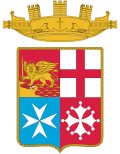 Corsaro II at Palma de Mallorca in 2007 | |
| History | |
|---|---|
| Name | Corsaro II |
| Operator | |
| Builder | Cantiere Navale Costaguta Voltri, Genova, Italy |
| Launched | 1960 |
| Commissioned | 5 January 1961 |
| In service | 1 |
| Home port | La Spezia |
| Identification | ITA 1643 (Sail number) |
| Status | in service |
| Notes | Pennant number A 5316 |
| General characteristics | |
| Type | Sail training ship |
| Tonnage | 47 t (46 long tons) full load |
| Length | |
| Beam | 4.7 m (15 ft 5 in) |
| Height |
|
| Draught | 2.9 m (9 ft 6 in) |
| Propulsion |
|
| Sail plan |
|
| Speed | 7.0 knots (13.0 km/h; 8.1 mph) by engine prop |
| Range | 500 nmi (930 km; 580 mi) at 7.0 knots (13.0 km/h; 8.1 mph) (on engine prop) |
| Complement | 16 |
Corsaro II is a yawl, active as a sail training vessel for the Italian Navy [1]
